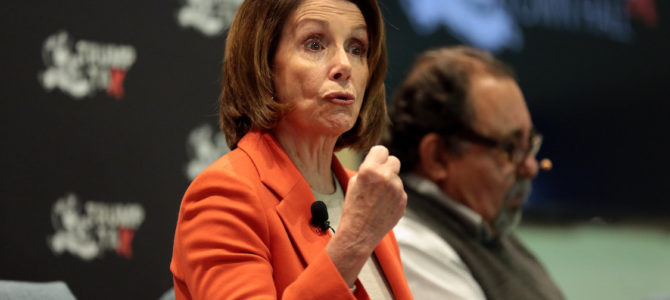
The problem with the Democrats’ impeachment gambit—aside from the fact that it appears to rest largely on a complaint riddled with inaccuracies, falsehoods, and hearsay—is that the American people don’t trust Congress and will likely have little confidence in any impeachment process undertaken by Democratic congressional leaders.
And no wonder. Ever since President Trump won the presidency in 2016, Democrats have been grasping for some pretext to invalidate the results of that election.
First, it was the outlandish claim that if Trump didn’t liquidate his global business interests upon taking office, he would be in violation of the emoluments clause. Then it was more than two years of the Russian collusion hoax that fizzled with the release of the Mueller report this spring. Along the way, there were repeated attempts to pin obstruction of justice on Trump for his firing of FBI director James Comey, as well as accusations about payments to Stormy Daniels, questions about Trump’s tax returns, and allegations of sexual assault.
None of this, in the minds of the vast majority of Americans, ever approached a justification for impeachment. A Quinnipiac poll released Wednesday found that just 37 percent support impeachment. A Monmouth poll last month showed just 35 percent support. For years, polls on impeachment have stayed in this range.
Democrats are therefore very far out of step with the American people on the question of impeachment, and it’s hard to see how the transcript of Trump’s conversation with Ukrainian President Volodymyr Zelensky, much less the “whistleblower” complaint released Wednesday evening, will change that. The complaint, with its allegation that Trump solicited interference in our elections from a foreign country, is in effect a continuation of the Russian collusion narrative Democrats spent two years pushing, to no avail.
In short, congressional Democrats don’t seem to appreciate how tenuous their position is now, or how a blatantly partisan impeachment inquiry could demolish all remaining confidence in our democratic institutions and set the country up for a crisis in the 2020 elections.
Even if there were a plausible case for opening impeachment proceedings against Trump, this Congress lacks the credibility to conduct them. Democrats have demonstrated over the past three years that they will do anything, say anything, and entertain any outlandish theory if it means removing Trump from office and undoing the 2016 election.
How can the American people possibly entrust them with an impeachment inquiry now? As one woman told The New York Times this week, “I’m like, yeah, boy who cried wolf.”
Trust In Congress Has Collapsed
For an impeachment, the importance of public trust in our political institutions can’t be overstated. Generally speaking, the American polity can only afford impeachment when social cohesion and trust in public institutions is high.
Congress has only initiated impeachment inquiries three times in U.S. history, and under circumstances far different than what we’re dealing with now. The two impeachment inquiries of the modern era, which resulted in very different outcomes, took place when the American people had far greater confidence in Congress.
In 1974, the same year Congress opened an impeachment inquiry against President Richard Nixon, Gallup began asking Americans about their approval or disapproval of Congress (a question asked of presidents beginning in the 1930s). That year, Congress received an average approval rating of 32 percent. By April of 1975, some eight months after Nixon resigned from office following the approval of three articles of impeachment against him, it was nearly 40 percent.
In October 1998, when the Republican-controlled U.S. House of Representatives voted to commence impeachment proceedings against President Bill Clinton, Congress had a 47 percent approval rating. By the time the Senate trial began in January 1999, Congress’s approval rating had risen to 50 percent. Even after Clinton was acquitted, Congress maintained better than 40 percent approval.
Today, congressional approval is less than half that: a recent Economist/YouGov poll found job approval of Congress at just 14 percent. And of course it’s not just Congress. We’re living through a period when public confidence in all our institutions has collapsed, including organized religion, labor, big business, public schools, and the news media. Only 17 percent of Americans now say they can trust the government, compared to three-quarters when the question was first asked in 1958.
In such an environment, congressional Democrats and the mainstream media should be at pains to prove their trustworthiness. But they’re doing just the opposite.
Consider that immediately after the release of the transcript of Trump’s call with Zelensky, a host of media outlets omitted a 540-word section of the conversation to make it appear that the “favor” Trump was asking for had to do with investigating former vice president Joe Biden and his son Hunter’s questionable dealings with a Ukrainian energy company. In fact, the “favor” Trump asked for was help with an investigation into meddling in the 2016 election.
Trump's mention of a "favor" was obviously in the context of asking for help with an investigation of the Russia collusion allegations and Clinton's server. Biden didn't come up until later in the call. This isn't hard to follow. The media is being stupefyingly dishonest. pic.twitter.com/0meGdcMvbF
— John Daniel Davidson (@johnddavidson) September 25, 2019
Or consider the performance Thursday of Democratic Rep. Adam Schiff, the chair of the House Intelligence Committee and one of the highest-profile Democrats calling for impeachment. Schiff eroded his fading credibility by reciting his own, made-up version of the Trump-Zelensky call during a congressional hearing, rather than simply reading the released and unredacted transcript.
So far, it doesn’t seem like Democrats or their allies in the media are at all aware of how the American public perceives them. By pursuing outlandish accusations against Trump for the better part of three years, then immediately distorting basic facts about the Ukraine affair, they have squandered their credibility on impeachment.
That’s a huge problem, especially if at some point Trump really does need to be removed from office. Gary J. Schmitt argues in The American Interest that the Founders saw impeachment as a necessary tool “if the newly crafted and powerful chief executive was to gain popular acceptance and the office not be amended by the state ratifying conventions.” Schmitt goes on to say that more frequent use of impeachment by Congress might put some “ballast” back in a constitutional system now dominated by the expansive powers of the modern presidency.
Maybe. The problem is that for impeachment to have this salutary rebalancing effect on our constitutional system, the American people have to see it as credible. There’s a reason House Speaker Nancy Pelosi had argued, right up until this week, that she would only open an impeachment inquiry if it had bipartisan support. She understands—or understood—that most Americans would see a purely partisan impeachment as an illegitimate use of Congress’s impeachment powers. Instead of a defense of the Constitution, impeachment would be seen as a partisan attempt to overturn the results of the 2016 election.
And now it most certainly will be. Given their appalling behavior to date, Democrats should accept that the American people won’t trust them with impeachment, and instead focus on the other way to remove Trump from office: winning the 2020 election.









